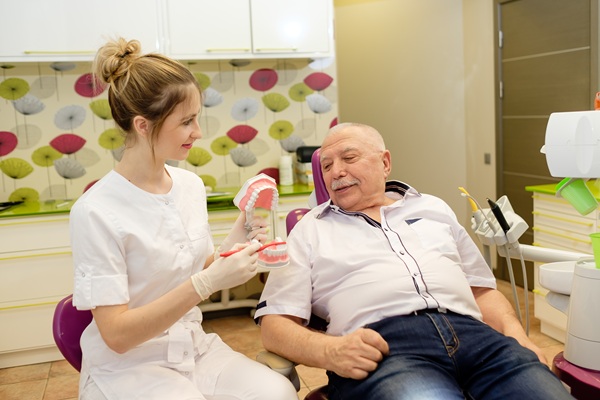Important First Steps If You Have a Dental Emergency

Anyone who has experienced a Dental Emergency can attest it is not fun. Not only is it painful, but it can also be scary. Even those who take good care of their teeth can experience a dental trauma, but the situation can be less stressful if one knows what to do.
Steps to take with a dental emergency
Following the appropriate steps can determine what type of help is needed and what other things can be done to get temporary relief.
Take some deep breaths
One thing that many people do who are experiencing a dental emergency is to panic. However, this is one of the worst things to do, because anxiety can activate body responses that can aggravate the situation. Take deep breaths and try to keep calm.
Determine type of emergency
Some emergencies require immediate attention, while others can wait a couple of days. Examples of non-urgent emergencies include a toothache, cracked tooth, damaged night guard or lost filling. Urgent situations include bleeding that will not cease, a broken jaw, a knocked out permanent tooth, a painful toothache and severe swelling.
Contact an emergency dentist
One thing to keep in mind is not all dentists handle emergency cases, so make sure to find one that does. If it is an urgent dental emergency, it is important to get in right away. If it is after hours or the dentist is unable to take immediate appointments, go to the emergency room.
If the situation is not pressing, explain to the dentist what is going on and set up an appointment for the next available opening. If it is the weekend, and the pain is bearable, it is usually OK to wait a couple of days.
Manage pain at home
There are certain things that can be done at home while waiting for an appointment or to help minimize long-term consequences if on the way to the ER. For a permanent tooth that has fallen out, it is important to keep it from drying out. Place the tooth back into the socket or into the cheek as soon as possible. If not, place it in a cup of milk or warm water.
Dental cement can be found over the counter, and it helps in a couple ways. Use it to affix a lost crown back onto the tooth. Dental cement also helps to cover a cracked tooth so it does not damage any other part of the mouth or tongue. If no cement, toothpaste can be used for the crown, and chewing gum on the broken tooth.
Pain and swelling can be very uncomfortable, and there are numerous remedies to help relieve them. Use an OTC or topical pain reliever and/or apply a cold compress to the area. Warm, salted water can also be swooshed around to help ease the pain.
Conclusion
When handled correctly, a dental emergency can be dealt with quickly and with minimal long-term consequences. Make sure to identify which emergencies need immediate attention and which can wait a little while.
Request an appointment here: https://www.drbrucematson.com or call Bruce Matson, DDS at (713) 481-4626 for an appointment in our Houston office.
Check out what others are saying about our dental services on Yelp: Emergency Dental Care in Houston, TX.
Recent Posts
Dental health professionals are responsible for providing a safe environment for emergency dentistry procedures during the Coronavirus (COVID-19) disease outbreak. Considering the risks of cross-infection in dental offices, the American Dental Association and the Center for Disease Control (CDC) have developed guidelines to control infections during any emergency dentistry care. This includes a thorough cleaning…
A dental emergency can come suddenly and without warning. It throws a wrench in your schedule and you are left panicking, grabbing the phone and dialing the closest emergency dentist, hoping for the best. Patients can be forced to deal with many kinds of dental emergencies: a lost filling, a loose crown — or even…
Nobody wants to have to deal with tooth pain, but it is also one of those things most people have to endure from time to time. Toothaches are generally caused by trauma, tooth decay, or some other oral health issue.The best way to guarantee that a toothache goes away, and stays away, is by visiting…
A chipped tooth can lead to serious complications, which is why it is so important to undergo a repair. There are many ways that a general dentist can treat a tooth with a chip in it, ranging from composite bonding to dental veneer placement. While it can be tempting to let a chipped tooth go,…


